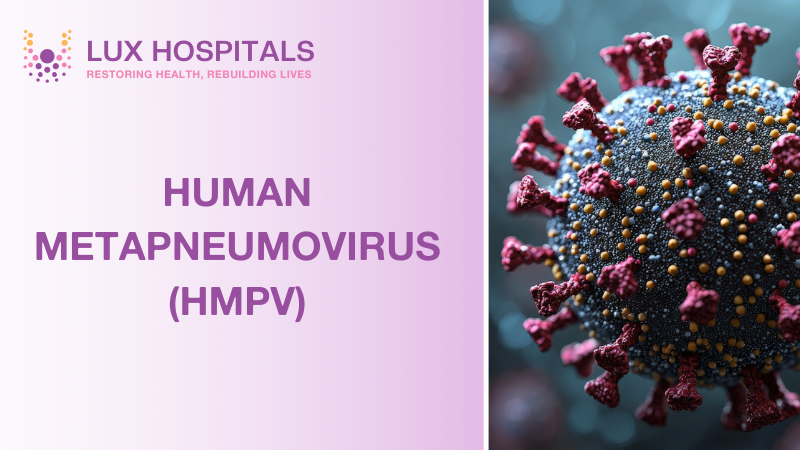Understanding the Rise of HMPV Virus Cases in India

In recent years, India has witnessed an alarming increase in cases of the Human Metapneumovirus. This respiratory virus has been generating serious health problems, particularly among vulnerable groups, while it is less commonly known.
This blog delves into the various aspects of the HMPV virus, including its symptoms, causes, diagnosis, and precautions, with a focus on its impact on different groups such as adults, children, infants, and pregnant women. We will also highlight specific HMPV cases in Hyderabad and across India.
What is the HMPV Virus?
The respiratory virus known as Human Metapneumovirus (HMPV) is a member of the Pneumoviridae family. Since its initial discovery in 2001, it has been identified to be a major risk factor for respiratory infections, particularly among children. The virus is very infectious because it spreads from respiratory droplets released by an infected person when they cough or sneeze.
HMPV Virus Symptoms
The symptoms of Human Metapneumovirus can range from mild to severe and often resemble those of other respiratory infections. Common HMPV virus symptoms include:
- Cough
- Fever
- Runny nose
- Sore throat
- Wheezing
- Shortness of breath
In severe cases, especially among the elderly, infants, and poor immune system individuals, the virus can lead to bronchitis or pneumonia, necessitating hospitalization.
Causes of the HMPV Virus
- Close contact with an infected person is one of the main ways the HMPV virus spreads.
- Exposure to contaminated surfaces can also lead to transmission of the virus.
- Outbreaks of HMPV are more common in the winter, as the virus thrives in colder climates.
- Living in close quarters can increase the risk of spreading the virus.
- Poor hygiene practices can facilitate the transmission of HMPV.
HMPV Virus in Adults
While the HMPV is more commonly associated with children, Human Metapneumovirus virus in adults can also lead to significant respiratory illness, especially in older adults or those with underlying health conditions.
Adults typically experience symptoms similar to those of the common cold, but complications can arise in severe cases.
HMPV Virus in Children and Infants
- Children are particularly vulnerable to the HMPV.
- HMPV virus in children often presents with more severe respiratory symptoms, and in some cases,
- This can develop into serious conditions like bronchiolitis and pneumonia.
- HMPV in infants is a critical concern as their immune systems are not fully developed, making them more likely to have severe infections.
HMPV Virus Rash and Its Implications
Sometimes, a rash may appear on an infected HMPV person. The body’s immune system may react to the infection by producing this uncommon HMPV viral rash. It is crucial to consult a doctor if a rash develops in order to rule out other potential causes.
HMPV Virus in Pregnant Ladies
The impact of the Human Metapneumovirus in pregnant ladies cannot be overlooked. Pregnant women are advised to maintain good hygiene and avoid close contact with individuals showing respiratory symptoms. The key to preventing issues is early detection and treatment.
Diagnosis and Testing for HMPV Virus
- Laboratory testing and clinical assessment are used to diagnose HMPV.
- A healthcare provider may recommend an HMPV test, such as a polymerase chain reaction (PCR) test, to confirm the virus.
- Early diagnosis of HMPV is crucial for effective management and treatment.
Treatment for HMPV Virus
As of right now, HMPV has no particular antiviral treatment. Management of the Human Metapneumovirus virus treatment focuses on relieving symptoms. This includes:
- Adequate hydration
- Rest
- Use of antipyretics for fever
- Use of bronchodilators in case of wheezing
In severe situations, supportive care like oxygen therapy and hospitalization may be necessary.
Precautions to Prevent HMPV Infection
Preventing the spread of HMPV is essential to reduce the burden on healthcare systems. Key Human Metapneumovirus virus precautions include:
- Frequent hand washing with soap and water
- Avoiding close contact with infected individuals
- Disinfecting commonly touched surfaces
- Wearing masks in crowded places
Conclusion
The rise in HMPV cases in India underscores the need for increased awareness and preventive measures. Understanding the HMPV virus symptoms, causes, and treatment options can help individuals take proactive steps to protect themselves and their families. Special attention should be given to vulnerable groups such as children, the elderly, and pregnant women to minimize the impact of this respiratory virus. By adopting good hygiene practices and seeking timely medical care, the spread of HMPV can be effectively controlled.
Frequently Asked Questions
HMPV symptoms include cough, fever, runny nose, sore throat, wheezing, shortness of breath, fatigue, and headache. In severe cases, particularly in young children, the elderly, or those with weakened immune systems, it can lead to bronchiolitis or pneumonia.
Yes; HMPV is a contagious respiratory virus. It spreads through direct contact with an infected person, respiratory droplets, or contact with contaminated surfaces. The transmission is similar to other respiratory infections like the flu.
In recent times, HMPV virus cases in Hyderabad have been on the rise, reflecting a broader trend across the country. The increase in HMPV virus cases in India highlights the need for greater public awareness and robust healthcare interventions to manage and contain outbreaks effectively.
HMPV and COVID-19 are both respiratory viruses, but caused by different viruses. HMPV is a paramyxovirus, while COVID-19 is caused by SARS-CoV-2. They share similar symptoms but differ in transmission and severity.
Human metapneumovirus (HMPV) can be dangerous, especially for young children, the elderly, and individuals with weakened immune systems. While most cases are mild, it can cause severe respiratory symptoms like bronchiolitis and pneumonia in vulnerable populations.
Currently, there is no vaccine available to prevent the spread of HMPV. Prevention mainly relies on good hygiene practices, such as frequent handwashing and avoiding close contact with infected individuals.




















